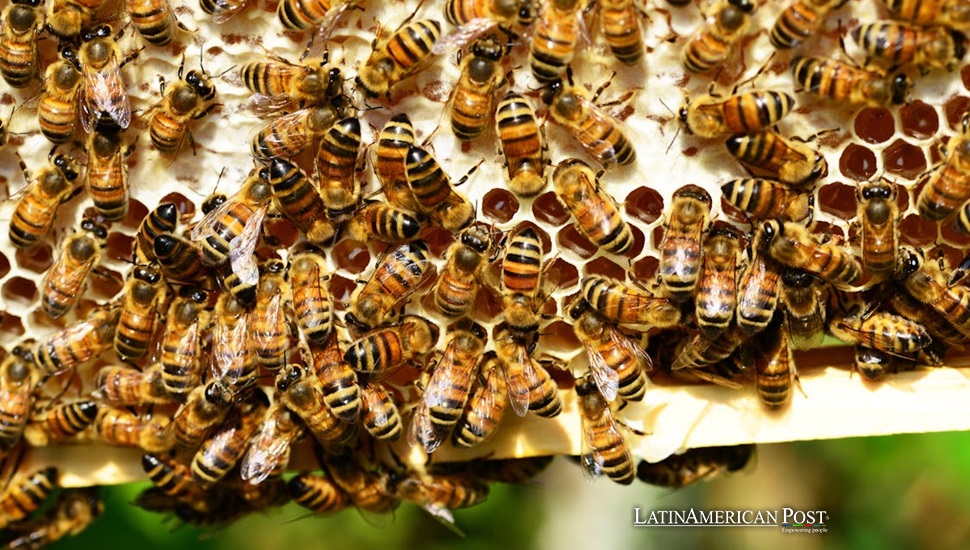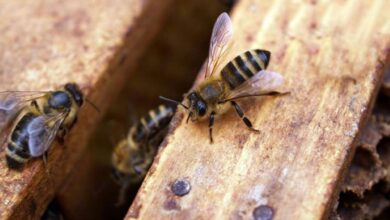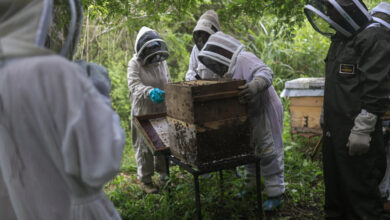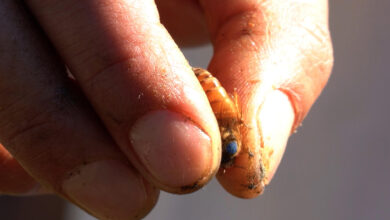Colombian Scientists Develop Breakthrough Supplement to Protect Bees’ Brains

In a groundbreaking discovery, Colombian scientists have developed a plant-based supplement that protects bees from the harmful neurological effects of pesticides. The urgency of this issue cannot be overstated, as the supplement promises to safeguard pollinators’ crucial role in food production and ecosystem preservation.
Bees: Guardians of Ecosystems and Food Security
Bees play a pivotal role in maintaining the balance of ecosystems and ensuring food security through pollination. These tiny yet vital creatures pollinate over 75% of the world’s food crops, making them indispensable to global agriculture. In Latin America, particularly in Colombia, where agriculture is a critical economic sector, bees are integral to sustaining coffee, fruit, and vegetable production. Without them, food supply chains and biodiversity would be severely threatened.
Yet, bees are facing an increasing threat from pesticide use. As agricultural practices rely heavily on chemicals to protect crops from pests, the unintended consequence has been widespread harm to pollinators like bees. Pesticides, particularly neurotoxic ones, are known to impair bees’ motor functions, memory, and overall neurological health, leading to significant declines in their populations. For years, scientists have been searching for solutions to counteract the impact of these chemicals on bees, and now, they may have found one.
A Plant-Based Solution to Combat Pesticide Exposure
In collaboration with the Department of Neuroscience at the University of Arizona and Colombia’s Universidad Javeriana, Colombian researchers from Rosario University in Bogota have made a promising breakthrough. They’ve developed a plant-based food supplement designed to protect bees from the neurotoxic effects of pesticides. This innovative solution could reverse the damage caused by agricultural chemicals and provide bees a fighting chance to survive in pesticide-laden environments.
“This is a nutritional solution to the problem bees face when exposed to pesticides,” said Andre Riveros, associate professor at Rosario University, in an interview with Reuters. “The food induces them to develop a protection against pesticides.”
The formula, derived from flavonoids—naturally occurring compounds found in plants—has shown great potential. Flavonoids are known for their human health benefits, including antioxidant and anti-inflammatory properties. Now, researchers are applying these same benefits to bees, using the compounds to help the insects cope with neurotoxins. These neurotoxins in many agricultural pesticides harm bees’ brain functions, affecting their ability to navigate, forage, and return to their hives.
During the early stages of the supplement’s development, researchers fed the bees individually while sedated and confined to small laboratory tubes. The results were promising: the bees displayed increased resistance to the harmful effects of pesticides.
The Future of Bee Protection
While the supplement was initially developed in controlled lab settings, researchers are now moving to real-world testing. Juan Jose Ovalle, a natural science student at Rosario University, explained that testing has progressed to a university apiary where bees are monitored more naturally.
“We already know that there are molecules that improve the bees’ health, and we already know that there are molecules that prevent neuronal damage caused by pesticides,” Ovalle told Reuters. “It’s important to continue this work to boost the effectiveness of these methods in supporting bees.”
The research team is optimistic about the supplement’s potential to strengthen bee populations. The supplement’s ability to mitigate the neurological damage caused by pesticides could revolutionize how farmers and environmentalists approach bee conservation. As the testing continues, scientists hope the supplement will prove effective in larger-scale applications, offering bees the protection they desperately need in agricultural environments.
A Lifeline for Bee Populations
The implications of this discovery extend far beyond Colombia. As pesticide use continues to grow globally, the threat to pollinators like bees is becoming more urgent. According to environmental experts, the decline of bee populations is a worldwide crisis with potential consequences for global food production and biodiversity. If the Colombian supplement proves successful in real-world testing, it could become a vital tool in international efforts to protect bee populations.
Moreover, this development aligns with a trend toward more sustainable agriculture practices. As consumers and policymakers push for eco-friendly solutions, innovations like the bee supplement offer a way to balance agricultural productivity with environmental preservation. By reducing the harmful impact of pesticides on bees, farmers could protect their crops while ensuring that pollinators can continue to thrive, offering a hopeful and optimistic outlook for the future.
The research team behind the supplement remains steadfast in their commitment to refining its formula and expanding its use in different regions. For now, they are focusing on fine-tuning the supplement’s effectiveness and ensuring that it can be deployed on a large scale. Their unwavering dedication should reassure us about the future of bee protection and a more sustainable future for agriculture.
In the words of Andre Riveros, “This is just the beginning. We aim to create a solution that can be used globally to protect bees and the ecosystems and food systems that depend on them.”
Also Read: Chilean Loa Frogs Escape Extinction and Begin Their Journey Home
The Colombian scientists’ development of a plant-based supplement to protect bees from pesticide damage could be a game-changer for global agriculture and environmental conservation. As bees continue to face unprecedented threats from neurotoxic chemicals, this breakthrough offers hope for their survival and food production’s future worldwide. With further testing and development, this innovation could play a critical role in preserving one of the most vital species on the planet.



